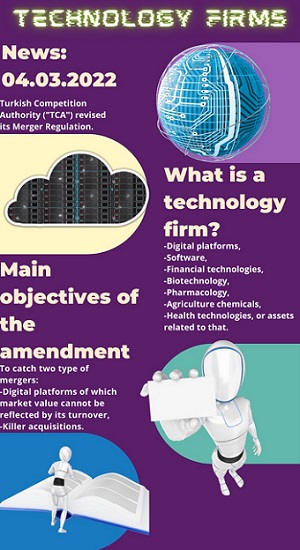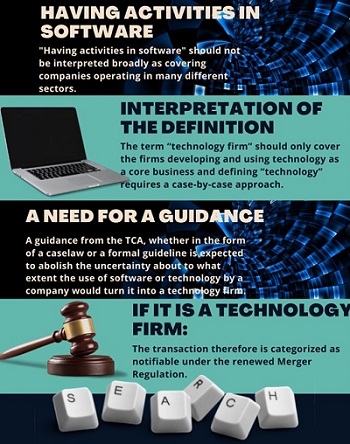On March 4, 2022, the Turkish Competition Authority ("TCA") revised its Merger Regulation since the thresholds set in 2013 remained substantially low in the face of inflation and the gradual depreciation of the Turkish currency. Apart from increasing the turnover thresholds, the new Merger Regulation introduced a new concept called "technology firms". The amended rules bring exception to the turnover threshold for notifiability, should the transaction involves a "technology firm". However, in the absence of enough reasoned decisions published, the question of how broad TCA interprets this definition remains unanswered.
How is it defined in the Regulation?
The Merger Regulation has a two-pronged view of identifying mergers and acquisitions that will significantly impede effective competition. Under the first scenario, the total turnover and the individual turnovers of the transaction parties in Turkey must exceed certain thresholds. The second scenario requires one of the transaction parties to have a high world turnover while the other to exceed a certain turnover threshold in Turkey.
As per the renewed Merger Regulation, the individual Turkish thresholds will not be applicable for the transactions in which the target is technology firm that is active or have R&D activities in the geographical market of Turkey; or provide services to users in Turkey. Under the renewed Merger Regulation, technology firms are defined as "undertakings that have activities in the areas of digital platforms, software and game software development, financial technologies, biotechnology, pharmacology, agriculture chemicals, and health technologies, or assets related to that."
By bringing the clauses "being active" or "having R&D activities" in Turkey, the Amendment resembles the location clause in German and Austrian merger regulations aiming to eliminate irrelevant transactions in a recently adopted merger notification system introducing the transaction value as a new threshold. Similarly, the Amendment targets to rule out the transactions which would not affect Turkish markets in the face of an increasing number of notifications with the new definition.
Even though there are some resemblances to the German and Austrian merger regulations regarding geographical coverage, the concept and definition of "technology firms" is entirely new and unique to the Turkish Merger Regulation. Therefore, it raises many questions about its scope and leads to an impatient wait for the coming caselaw. Especially, "having activities in software" may be interpreted broadly to cover companies operating in many different sectors yet using software systems for their daily operations. This uncertainty about to what extent the use of software or technology by a company would turn it into a technology firm poses uncertainty for the undertakings and the risk of TCA being overwhelmed with numerous unrelated notifications. Before the caselaw shows us the way, we believe that the covered businesses and the main objectives of the Amendment may give some hints about which this Regulation truly targets companies.
The Main Objective of the Amendment and its Implications
In its announcement, TCA stated that one of the concerns expressed in the control of mergers and acquisitions worldwide is that the acquisitions of start-ups by undertakings with high market power may fall outside the oversight due to the turnover thresholds1. Hence, the Amendment's objective was to subject the acquisitions of technology enterprises to the oversight of TCA and to prevent killer acquisitions.
To this extent, the emphasis on killer acquisitions may guide us in identifying the covered firms in this new definition. OECD reports point out that nascent acquisitions can occur across a range of different markets and sectors but are likely to be most common in areas where firms acquire start-ups for their potential, for example, in pharmaceuticals, chemicals, and technology markets2.
Additionally, one of the well-known concerns for digital platforms and their mergers is the uncontrollable growth of the big tech platforms, mainly resulting from the takeovers. Several reports point out that the big tech platforms completed over 350 acquisitions globally over ten years, and many jurisdictions have scrutinized those transactions closely3. Alongside the potential of these technology markets for nascent takeovers, the concerns about the effectiveness of the current merger regimes to catch the transactions in digital markets led to discussions worldwide on how to revise merger regimes to catch recent escaper transactions. It seems that TCA intends to overcome this challenge by defining technology firms and subjecting them to particular thresholds.
Summarizing the outcomes of the definition itself and the announcement, this Amendment can be argued to aim to catch two types of mergers:
- The takeover of the digital platforms of which market value cannot be reflected by its turnover due to the digital market characteristics (like the Facebook and WhatsApp transaction, which was not subject to notification in many jurisdictions due to the low turnover of WhatsApp).
- Killer acquisitions, where big companies acquire a potential competitor early when it does not exceed the turnover thresholds.
Technology Firms?
Within this approach, if we analyze each component of the definition in technology firms, the TCA's understanding of the "digital platforms" may correspond to the Digital Markets Act's ("DMA") definition of the "undertakings providing core platform services". Core platform services, as defined by the DMA, are:
- online intermediation services;
- online search engines;
- online social networking services;
- video-sharing platform services;
- number-independent interpersonal communications services;
- operating systems;
- web browsers;
- virtual assistants;
- cloud computing services;
- online advertising services, including any advertising networks, advertising exchanges, and other advertising intermediation services, are provided by an undertaking that provides any of the core platform services listed above.
The second category of technology firms  under the TCA's definition
is software and game software development companies. The context of
"software" is the most controversial one among all, as
said before. However, within the context of the abovementioned
concerns, the Amendment is argued to target
the software
development companies potentially subject to
killer acquisitions, not the companies using
software in their daily operations. As per this
approach, it can also be argued that the companies operating in
many different markets, from advertising to law, developing
software solutions for their customers alongside their primary
business services, are not within the scope of the technology
firms.
under the TCA's definition
is software and game software development companies. The context of
"software" is the most controversial one among all, as
said before. However, within the context of the abovementioned
concerns, the Amendment is argued to target
the software
development companies potentially subject to
killer acquisitions, not the companies using
software in their daily operations. As per this
approach, it can also be argued that the companies operating in
many different markets, from advertising to law, developing
software solutions for their customers alongside their primary
business services, are not within the scope of the technology
firms.
A similar approach can be adopted to define the boundaries of fintech and health-tech companies. For example, the development and use of the software by a bank should not classify them as a technology firm operating in the field of fintech. Similarly, a hospital may provide software to its patients to track their medical examinations and doctor visits. If a company were to acquire this hospital, arguing in favor of a merger control filing within the scope of technology firm exemption would be a stretch since the development, and the use of the software by this hospital is ancillary to its core operations.
We believe the term "technology firm" should only cover the firms developing and using technology as a core business. Even with this approach, defining a specific product or service as "technology" is still hard. For example, the "health technology" term would need an in-depth analysis if a healthcare company were to develop a new diagnostics device.
Overall, any broad definition of "technology firms" is expected to make the intended system jam due to an overwhelming number of filings facing the TCA. Therefore, limiting the scope of the term "technology firm" to the firms that are developing and using technology as a core business would solve a big part of the problem. Nevertheless, defining "technology" would still require a case-by-case approach. Practitioners and companies will keep a close eye on any guidance from the TCA, whether in the form of a caselaw or a formal guideline.
Footnotes
1 Rekabet Kurumu - Rekabet Kurulundan İzin Alınması Gereken Birleşme ve Devralmalar Hakkında Tebliğ ve Birleşme ve Devralmaların Değerlendirilmesi Hakkında Kılavuzlara İlişkin Değişiklikler, Erişim Tarihi, 27.09.2022
2 OECD (2020), Start-Ups, Killer Acquisitions and Merger Control, p. 11.
3 OECD (2020), Start-Ups, Killer Acquisitions and Merger Control, p. 14.
The content of this article is intended to provide a general guide to the subject matter. Specialist advice should be sought about your specific circumstances.


